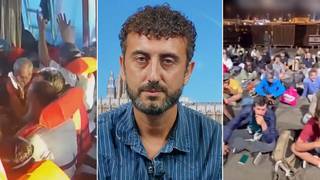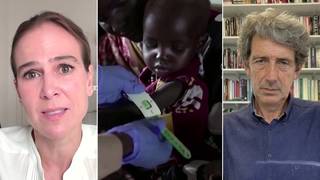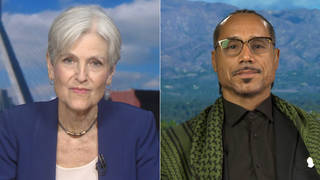
Topics
Nader outlines solutions to the problems facing the country. These include developing alternative energy sources; following up on pilot housing projects to solve homelessness; a universal single-payer healthcare system modeled on Canada’s; fast, reliable and pollution-free public transportation; the use of pest management control, crop rotation and organic farming; a shift toward citizen and liberal education; upgraded labor laws; tax checkoffs to prevent pharmaceutical corporations from getting big gains from publicly funded research; public funding of elections; improved ballot access for third parties; establishing the initiative, referendum and recall in every state; adding a binding “none of the above” option to the ballot; 12-year legislative term limits; and the reconstruction of civic community.
Transcript
AMY GOODMAN: This is Democracy Now! on Pacifica Radio. I’m Amy Goodman. We are now playing the speech that you didn’t hear on TV last night. Ralph Nader was speaking at UCLA, accepting the presidential nomination from the Green Party. In this segment of his speech, he lays out solutions.
RALPH NADER: Our country is beset by problems it doesn’t deserve and solutions it doesn’t apply. Look at the basic problems.
Energy: Solar energy, energy efficiency — those are the solutions. They’re being proven all over the country.
Housing — housing — housing: There are pilot housing projects showing the way to go, so we don’t have this disgraceful, inadequate, decrepit, decayed housing stock, not to mention the homeless. It’s a scar on all our consciousness that there are homeless people, many of them working poor, many of them veterans, many of them who can’t make a go on $4.25 an hour, while the legislators are increasing their salaries to $64 an hour plus all kinds of health insurance and other benefits.
Healthcare: We have the solution to healthcare. No solutions are perfect, but they certainly are a lot better than the problems. Universal healthcare, the single-payer Canadian system. In Canada, you have free choice of doctor, hospital, on 10% of their economy, maybe 11% now. Everybody has access to healthcare from cradle through nursing home. And I might add, our country is going to spend 15% this year on healthcare, with tens of millions of people being excluded, dropped out or otherwise underinsured. Yeah, the Conservative Party in Ottawa built up a huge deficit; the Liberal Party is now squeezing the provinces in terms of the contribution to the healthcare budget. But by comparison with our problems, we should have Canada’s problems in terms of healthcare coverage.
Modern public transit: All kinds of new technologies, flexible, fast, safe. Look at the work done at Northwestern University for almost 30 years on this subject and ask yourself, “Why don’t we have the kind of modern public transit that’s fast, reliable, that’s very close to zero polluting?” We have the solutions.
Agriculture: Instead of highly chemical-intensive agriculture, burning the earth, contaminating farmers and farmworkers alike, in one of the more occupationally hazardous workplaces in the country, it’s been proven again and again: pest management control, organic agriculture, all kinds of crop rotation.
Education: Education, at best, is now a trade school. It’s just a job training center, at best, for corporations, instead of the liberal education, the civic education, that needs to go on up in colleges. They’re vocational schools now, preparing themselves to be small cogs in big corporate wheels, instead of learning how to be civically skilled. Why don’t we do that? The most important skill in America today is citizenship skills. It should be taught in elementary school, in high school, in college, in graduate school, and taught by connecting the classroom to the community, so that youngsters can work under adult supervision and learn how to practice democracy and become understanding of what they have to do to build the future for our country and the world. …
Tools of democracy should be a priority for the Green Party and citizens all over the country.
The labor laws have to be upgraded. They cannot be utilized by industrial workers, in particular. So weakened have they become.
The taxpayers should have checkoffs on tax returns to deal with taxpayer assets being ripped off by corporations, like the federal lands, like medical research and development, like all kinds of innovations that the taxpayers paid for. It is outrageous. It is outrageous that a woman with ovarian cancer has to pay Bristol-Myers Squibb over $10,000 for a series of treatments to get the drug Taxol, which was developed, from A to Z, by $31 million of taxpayer money out of the National Institutes of Health, and given free, with no price control and no royalties back to you, the taxpayer, to Bristol-Myers Squibb, that immediately priced it at over $10,000. The same occurred to AZT. The same occurred to all kinds of drugs, where sick people are now expected to fork over $50,000, $100,000. This isn’t America. When many of these drugs were paid for, or substantially paid for, by taxed money, in terms of the National Institutes of Health drug research and development program.
Our elections and election procedures need change, the way you get public elections of public — public funding of public elections. And, you know, what’s the alternative? It’s either General Motors, General Electric or DuPont funding our elections, or it’s public financing of elections. It can be done. It’s simple.
Check this out: The best investment return in the history of the world is the billion dollars that corporate-sourced campaign money puts into federal elections every two years. Can you imagine the tens of billions of dollars they get in return? Corporate welfare, the nonenforcement of health and safety laws, the inflated and wasteful government contracts, the seizure of the public lands, the appropriation of all these taxpayer assets. A billion dollars. What’s a billion dollars? They have $12 billion in debt erased with one paragraph, $8 billion in another. They get away with $100 billion of healthcare fraud just on the bills that they submit. Pretty soon it adds up to real money.
Now, how do we replace that billion dollars every two years? First of all, by a well-promoted voluntary dues checkoff on the 1040 tax return, up to $100 per taxpayer, if the taxpayer chooses to contribute, and a certain amount of free time on radio and TV for ballot-qualified candidates. And guess what. And guess what. That amounts, by the way, to about $7 per taxpayer per year — per every two years, excuse me. And it would less than a billion dollars every two years, because they won’t have to spend so much money to raise it. So, public financing of public elections. The billion-dollar displacement movement must start immediately.
How about ballot access barriers? Our political electoral system is not kind to small political starts. It’s not kind to acorns. It says to the acorn, “You’ve got to be an oak tree — voilà! — immediately, before you get on the ballot or you qualify.” Now, what’s interesting here is this: Because there are so few independent petitions for presidential candidates by grassroot groups, a number of states had barriers that were surmountable.
What happened in the last eight years? As more and more third-party candidates got on, states like Texas starting passing laws to make it more onerous — a larger number of signatures, a larger number of disqualifications — in order to get, through petition, a candidate on the ballot. And that’s what you’re going to confront in the next legislative sessions of the states. The two-party duopoly wants to control the electoral arena. And they will do everything to exclude petitions and citizen parties from competing with them. And that has got to be removed, so that a real, genuine tool of democracy means the ease of getting on the ballot.
And how about more direct democracy, when representative democracy makes a mockery of itself because it’s in hock to special interest groups? The initiative, the referendum, the recall should be in every state of the union. And those Republicans who campaigned in New Jersey to elect a Republican governor and a Republican Legislature on the promise that they would bring to New Jersey the initiative, referendum and recall double-crossed the voters and pursued business as usual. That’s why you can’t rely on this kind of elected officials, and why we have to have the direct democracy insurance policy.
How about this? None of the above. Binding none of the above. In our country, you can’t go to the polls and vote no. All you can do is either vote yes for somebody or stay home, and not vote and be called apathetic and a dropout. How do you vote no? How do you say you don’t care for the candidates on the ballot? You vote — even Green will have a “none of the above” on the ballot. It’s part of the platform. Binding none of above congeals a protest vote, a no vote, a go back and give us something better. And if none of the above wins and gets more votes than the other candidates on the ballot, it cancels the election, sends the candidates packing, and orders a new election 30 days from now.
ANNOUNCER: This is KPFK Los Angeles, KPFT Houston, Ralph Nader speaking to the Green Party convention, accepting the nomination for president, that the Green Party voted upon just a couple of hours ago.
RALPH NADER: By the way, we now have a project out of Pennsylvania to advance a binding none of the above, whether by initiative or by legislation. By initiative is much more likely. It can be done at the local level, for starters, at the state, eventually at the national level. I’d love to see the politicians who have been defeated by none of the above. No longer — no longer will they be able to say to the American people, “Vote for one us or stay home.” That’s the key change.
Term limits: I’m for 12 years, term limits, on the grounds that most people, after 12 years in Congress or in state legislatures, with almost no exception — maybe one of two out of a hundred — either sell out or wear out. They get resigned. They start throwing in the towel. They get eroded. They tire. New energies are needed.
And so, let’s start thinking about: How can we develop these more powerful citizen tools of democracy for workers, taxpayers, consumers, voter citizens and investor shareholders, especially through pension plans? Do you know that the labor pool of pension money, if it was controlled by the workers though intermediate mechanisms, could control many of the large corporations on the New York Stock Exchange? Because that’s where the money is invested, isn’t it?
Isn’t it time that we made a national political issue out of this enormous anomaly that we own the public airwaves but don’t control anything, that we own the public lands but don’t control our public lands, that own $4 trillion of pension moneys and don’t control their investment, that we own trillions of dollars in mutual insurance and mutual savings, and the banks and the insurance companies and other corporations control what we legally own?
And that’s partially a problem that comes from growing up corporate, from being told, from when we were very young, that if we work hard and make money, we’ll be able to own individual property, like a car, a boat, a home, a piece of land. But we’re never told that we are already owners, by virtue of our birthright, of the great commonwealth of resources and assets, from the natural resources on the public lands to the huge pools of capital controlled by the grip of a few giant corporate investors.
And so, we need to keep looking to reconstruct civic communities. Where there is no community, there is crisis. Without people, nothing is possible. Without institutions, nothing is lasting. We have to keep creating them. The corporate juggernaut is such that it cannot tolerate strong countervailing communities, whether of workers, whether of parties that are independent of them, whether they’re consumer associations, whether they’re students who want to band together for civic engagement and improvement of their society.
It’s really not surprising that many of the things they’re doing against public education, against community services — the whole privatization, the whole corporatization movement — is designed to take public communities and turn them into private, profit-making centers, where the sense of community service and obligation is eliminated. That’s what user fees are all about: “Oh, you want use the library? You’ve got to pay every time you go in there. Pay as much as you use.” The library in America was built as a community service, community supported. “You want to use the national parks? Oh, you’ve got to pay. If you don’t use it, you don’t pay.” It breaks the whole community service apart. And they’re doing this now in the healthcare industry at some extreme level.
AMY GOODMAN: Consumer advocate Ralph Nader accepting the Green Party nomination for president last night in California. You know, The New York Times says today that Nader has been somewhat out of the limelight in recent years. I think “frozen out” would be a better way of putting it. And after hearing this speech, you may have a better idea about why those corporations that shine the limelight — the media — has kept it away from him.
Democracy Now! is produced by Julie Drizin and engineered by Kenneth Mason, here at the studios of WPFW in Washington. Thanks to the staff of KPFK who brought us this speech of Ralph Nader’s last night. We welcome your response to his speech and the Green Party ideas. Call our listener comment line at (202) 588-0999 extension 313. That’s (202) 588-0999 extension 313. Or write us via email at democracy@pacifica.org. That’s democracy@pacifica.org. I’m Amy Goodman. Thanks for listening to another edition of Pacifica Radio’s Democracy Now!












Media Options